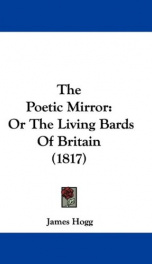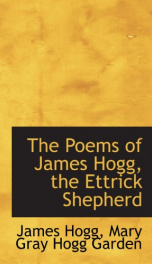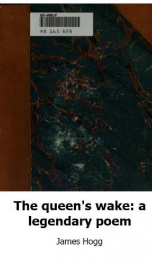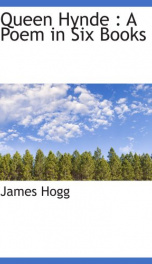Hogg James

James Hogg (1770 – 21 November 1835) was a Scottish poet and novelist who wrote in both Scots and English. James Hogg was born in a small farm near Ettrick, Scotland in 1770 and was baptized there on 9 December, his date of birth having never been recorded.[1] His father, Robert Hogg (1729–1820), was a peasant farmer while his mother, Margaret Hogg (née Laidlaw) (1730–1813), was noted for collecting native Scottish ballads.[2][1] James was the second eldest of four brothers, his siblings being William, David, and Robert (from eldest to youngest).[3] Robert and David later emigrated to the United States, while James and William remained in Scotland for their entire lives.[3] James had little formal education, and became a shepherd, living in grinding poverty, hence his nickname, 'The Ettrick Shepherd'. His employer, James Laidlaw of Blackhouse, seeing how hard he was working to improve himself, offered to help by making books available. Hogg used these to essentially teach himself to read and write (something he had achieved by the age of 14). In 1796 Robert Burns died, and Hogg, who had only just come to hear of him, was devastated by the loss. He struggled to produce poetry of his own, and Laidlaw introduced him to Sir Walter Scott, who asked him to help with a publication entitled The Minstrelsy of the Scottish Border. In 1801, Hogg visited Edinburgh for the first time. His first collection, The Mountain Bard, was published in 1807 but he struggled to make an impact on the literary scene. Another venture, a magazine, The Spy failed after a year. But his epic story-poem, The Queen's Wake (the setting being the return to Scotland of Queen Mary (1561) after her exile in France), was published in 1813 and was a success. Now a well-known literary figure (if often mocked for his rustic accent and appearance), he was recruited by William Blackwood for Blackwood's Magazine. It was through Blackwood's that Hogg found fame, although it was not the sort that he wanted. Launched as a counter-blast to the Whig Edinburgh Review, Blackwood wanted punchy content in his new publication. He found his ideal contributors in John Wilson (who wrote as Christopher North) and John Gibson Lockhart (later Walter Scott's son-in-law and biographer). Their first published article, "The Chaldee Manuscript", a thinly disguised satire of Edinburgh society in biblical language which Hogg started and Wilson and Lockhart elaborated, was so controversial that Wilson fled and Blackwood was forced to apologise. Soon Blackwood's Tory views and reviews - often scurrilous attacks on other writers - were notorious, and the magazine, or "Maga" as it came to be known, had become one of the best-selling journals of its day. But Hogg quickly found himself forced out of the inner circle. As other writers such as Walter Maginn and Thomas de Quincey joined, he became not merely excluded from the lion's share of publication in Maga, but a figure of fun in its pages. Wilson and Lockhart were dangerous friends. Hogg's Memoirs of the Author's Life were savagely attacked by an anonymous reviewer, probably Wilson, and in 1822 the magazine launched the "Noctes Ambrosianae" or "Ambrosian Nights", imaginary conversations in a drinking-den between semi-fictional characters such as North, O'Doherty, The Opium Eater and the Ettrick Shepherd. The Shepherd was Hogg. The Noctes continued until 1834, the year of the real Hogg's death, and were written after 1825 mostly by Wilson, although other writers, including Hogg himself, had a hand in them. The Shepherd of the Noctes is an extraordinary creation, part-animal, part-rural simpleton, part-savant, easily the most memorable character in the series, who speaks some of the richest and saltiest Scots ever written. He became one of the best-known figures in topical literary affairs, famous throughout Britain and its colonies. Quite what the real James Hogg made of this is mostly unknown, although some of his letters to Blackwood and others express outrage and anguish. What is known is that in 1824, no longer highly regarded in Edinburgh, largely excluded from Blackwood's, now in his fifties but with a young family, and writing desperately quickly for money to try to save his failing farm, Hogg wrote his famous tale of persecution, delusion, devilish mimickry and tortured consciousness: The Private Memoirs and Confessions of a Justified Sinner. It did not do well. Barely reviewed in Blackwood's, it became a largely forgotten book until over a century later when the French writer, André Gide, was loaned it by Raymond Mortimer.[4] Gide was amazed, writing that "It is long since I can remember being so taken hold of, so voluptuously tormented by any book."[4][5] Its republication in 1947, with an enthusiastic introduction by Gide,[6] helped bring about the modern critical and academic appreciation of this novel. The bulk of Hogg's writing was bowdlerised in the 19th century and neglected for most of the 20th. Apart from The Confessions, which even his detractors acknowledged as unusually powerful (and often attributed to someone else, usually Lockhart), his novels were regarded as turgid, his verse as light, his short tales and articles as ephemera. But growing interest in The Confessions led to the rediscovery and reconsideration of his other work in the late 20th and early 21st centuries. Now his novel The Three Perils of Woman is also considered a classic and all his work, including his letters, is undergoing major publication in the Stirling/Carolina editions. However, Justified Sinner remains his most important work and is now seen as one of the major Scottish novels of its time, and absolutely crucial in terms of exploring one of the key themes of Scottish culture and identity: Calvinism. In a 2006 interview with Melvyn Bragg for ITV1, Scottish novelist Irvine Welsh cited Hogg, especially The Confessions as a major influence on his writing. Hogg's story "The Brownie Of The Black Haggs" was dramatised for BBC radio 4 in 2003 by Scottish playwright Marty Ross as part of his "Darker Side Of The Border" series. The play can be downloaded at Mouse-World .
do you like this author?
What readers are saying
What do you think? Write your own comment on this book!
write a commentWhat readers are saying
What do you think? Write your own comment on this author!
write a commentBook list

The Three Perils of Man,Vol. 2 (of 3)or,War,Women,and Witchcraft
Series:
Unknown
Year:
Unknown
Raiting:
4.5/5
Show more
add to favoritesadd In favorites

The Three Perils of Man,Vol. 1 (of 3)or,War,Women,and Witchcraft
Series:
Unknown
Year:
Unknown
Raiting:
4.5/5
Show more
add to favoritesadd In favorites
Book list

The Three Perils of Man,Vol. 2 (of 3)or,War,Women,and Witchcraft
Series:
Unknown
Year:
Unknown
Raiting:
4.5/5
Show more
add to favoritesadd In favorites

The Three Perils of Man,Vol. 1 (of 3)or,War,Women,and Witchcraft
Series:
Unknown
Year:
Unknown
Raiting:
4.5/5
Show more
add to favoritesadd In favorites

the poetic mirror or the living bards of britain
Series:
Unknown
Year:
Unknown
Raiting:
4/5
Show more
add to favoritesadd In favorites

the poems of james hogg the ettrick shepherd
Series:
Unknown
Year:
Unknown
Raiting:
5/5
Purchase of this book includes free trial access to www.million-books.com where you can read more than a million books for free. This is an OCR edition with typos. Excerpt from book: CONCLUSION. Friend of the bard, peace to thy heart ! Long hast thou acted generous part, Long hast thou courteously in pain Attended to a feeble strain, While oft abashed has sunk thine eye Thy task is done, the Wake is bye. I saw thy fear ; I knew it just ; 'Twas not for minstrels long in dust, But for the fond and venturous swain Who dared to wake their notes again ; Yet oft thine eye has spoke delight, I marked it well, and blessed the sight; No sour disdain, nor manner cold, Noted contempt for tales of old ; Oft hast thou at the fancies smiled, And marvelled at the legends wild ; Thy task is o'er ; peace to thy heart! For thou hast acted generous part. 'Tis said that thirty bards appeared, That thirty names were registered, With whom were titled chiefs combined, But some are lost, and some declined Woe's me that all my mountain lore Has been unfit to rescue more, And that my guideless rustic skill Has told those ancient tales so ill ! The prize harp still hung on the wall; The bards were warned to leave the hall Till courtiers gave the judgment true To whom the splendid prize was due. What curious wight will pass with me The anxious motley group to see ; List their remarks of right and wrong, Of skilful hand and faulty song, And drink one glass the bards among ? There sit the menbehold them there Made maidens quake and courtiers stare, Whose names shall future ages tell; What do they seem ? behold them well ! A simpler race you shall not see, Awkward and vain as men can be ; Light as the fumes of fervid wine, Or foam-bells floating on the brine, The gossamers in air that sail, Or down that dances in the gale. Each spoke of other's fame and skill With high applause but jealous will. Each song, each strain, he erst had known, And all had faults except his... --This text refers to an alternate Paperback edition.
Show more
add to favoritesadd In favorites

the mountain bard consisting of ballads and songs founded on facts and legenda
Series:
Unknown
Year:
Unknown
Raiting:
2.5/5
Show more
add to favoritesadd In favorites

tales of james hogg the ettrick shepherd volume 2
Series:
Unknown
Year:
Unknown
Raiting:
3/5
Show more
add to favoritesadd In favorites
What readers are saying
What do you think? Write your own comment on this author!
write a commentif you like Hogg James try:
readers also enjoyed
What readers are saying
What do you think? Write your own comment on this author!
write a commentGenre
if you like Hogg James try:
readers also enjoyed
Do you want to read a book that interests you? It’s EASY!
Create an account and send a request for reading to other users on the Webpage of the book!



